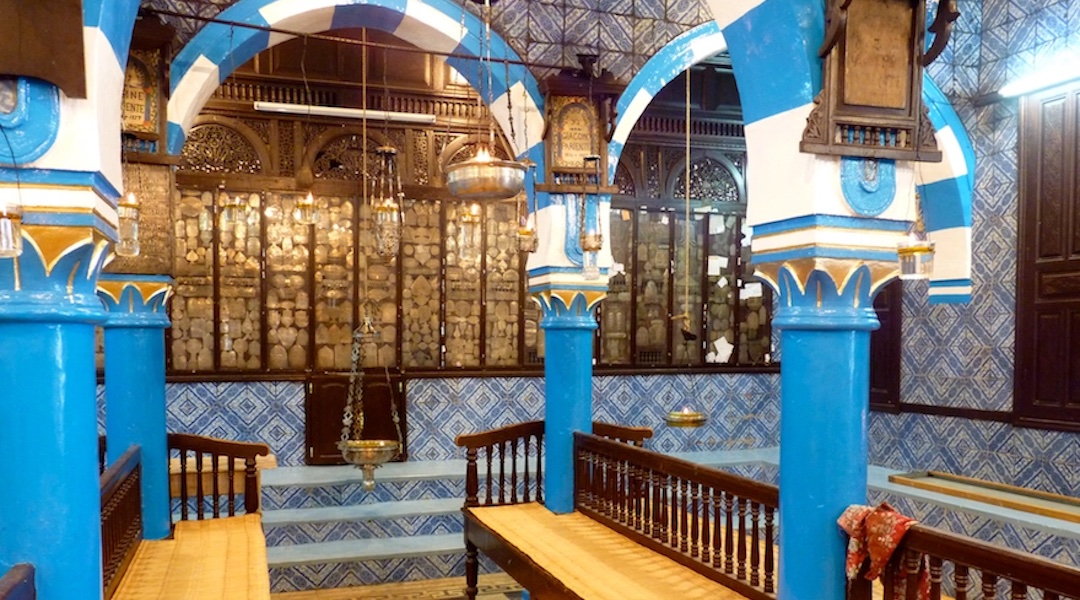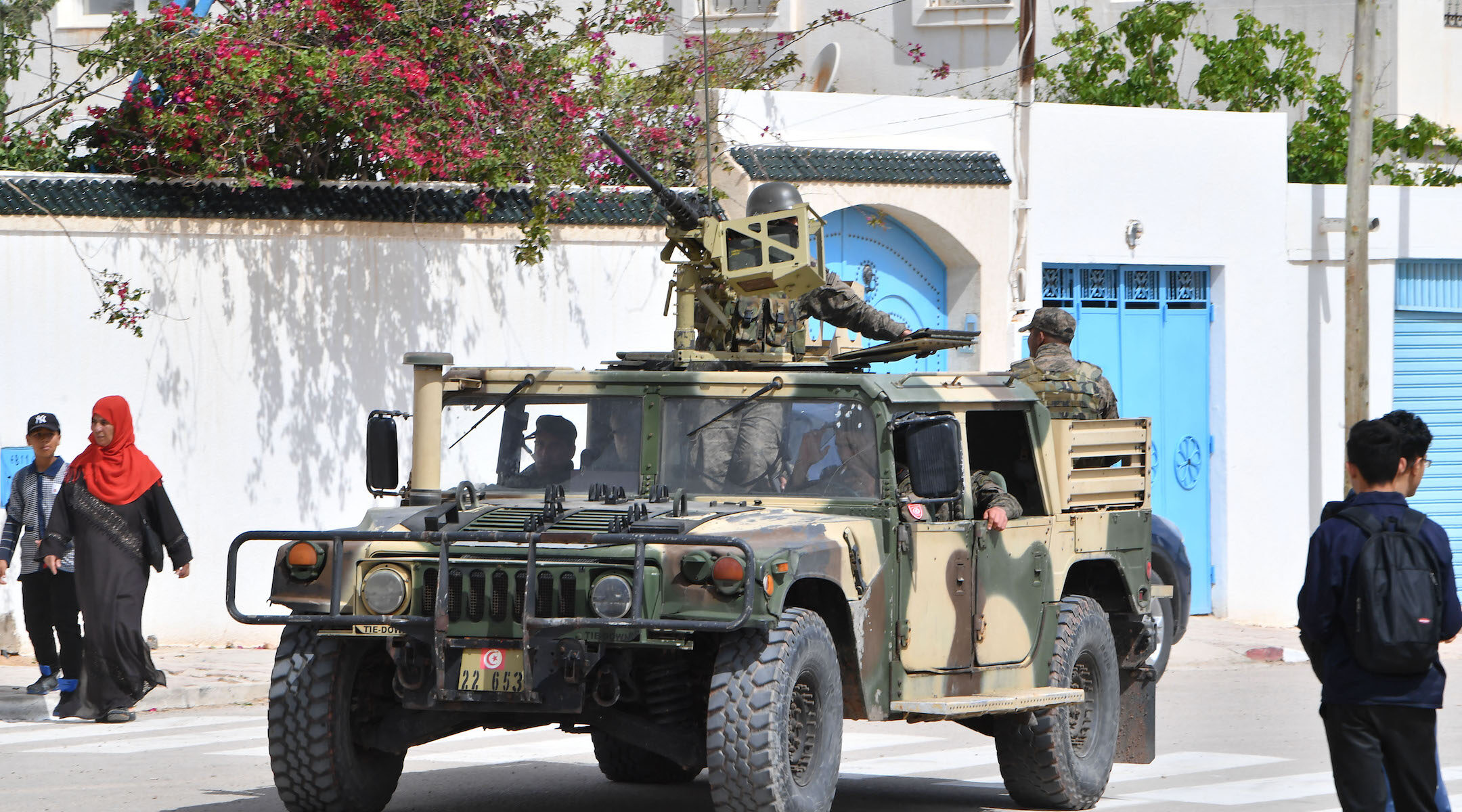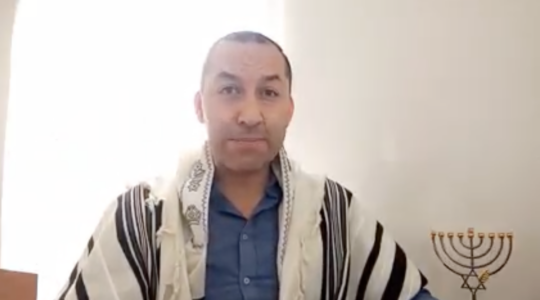(JTA) — When a security official opened fire outside a Tunisian synagogue during a pilgrimage on Tuesday night, killing two Jewish pilgrims and two security guards, he shattered what was meant to be a day of sacred celebration for the country’s Jews and their compatriots around the world.
The shooting at the synagogue in Djerba, an island in Tunisia, is the deadliest attack on the holy site in more than 20 years. It brought tragedy to a public celebration of Jewish life at Africa’s oldest Jewish house of worship.
Here’s an introduction to the Jews of Tunisia, the annual pilgrimage to Djerba and how the community is reacting to Tuesday’s attack.
Who are the Jews of Tunisia?
Jews have lived in Tunisia since ancient times. Archaeological evidence has shown that there was a Jewish community in the area that once surrounded the Roman city of Carthage, and Jewish life continued to exist there as the territory was conquered by Muslim empires, France and Nazi Germany. During the Holocaust, the Nazis seized Jewish property, put thousands of Jews in forced labor camps and persecuted them in other ways.
Tunisia gained independence in 1956. During and after Israel’s victory in the Six-Day War in 1967, Jews endured an increasingly hostile environment, including antisemitic riots and the torching of a synagogue in Tunis. In the years that followed, the vast majority of the country’s Jews emigrated, shrinking a Jewish population that once may have numbered more than 100,000 to around 1,000-1,500 today.
What is the Djerba synagogue, and why does it host an annual pilgrimage?
Tradition has it that the synagogue on the island of Djerba was founded at the time of the destruction of the First or Second Jewish Temple in Jerusalem in either 586 BCE or 70 C.E., and contains a stone from the temple. Today the synagogue, which was rebuilt in the 19th century, has rows of benches, brilliant white-and-blue arches as well as an outdoor arcade and other resplendent design features.
The synagogue’s name, El Ghriba, means “the isolated one” and comes from another legend. According to “A History of Jewish-Muslim Relations,” published in 2013, local Jews long ago found the body of a girl who lived and died alone — but whose body was miraculously preserved.
That incident was also the inspiration for the annual pilgrimage on the holiday of Lag B’Omer, which takes place each spring, a little more than a month after the beginning of Passover. Pilgrims who come to the synagogue pray, dance, sing, feast, light candles and write their wishes on hard-boiled eggs.
In the 1990s, the pilgrimage attracted some 10,000 people, according to a report in The Conversation, and attracts thousands today. Since 2011, Israelis have been able to enter the country for the pilgrimage even though Israel and Tunisia do not maintain diplomatic relations. The pilgrimage was canceled in 2011 following the Arab Spring, which began in Tunisia, and attendance dipped in subsequent years. The pilgrimage was also canceled in 2020 and 2021 due to the COVID-19 pandemic.

The main prayer hall of the El Ghriba Synagogue on Djerba. (Wikimedia Commons)
Has the synagogue ever been attacked before?
Yes. In 2002, al-Qaeda set off a truck bomb near the synagogue that killed 20 people, most of them German tourists, about six weeks before the pilgrimage. Tunisia’s government denounced the attack and paid to restore the damage.
And in 2018, five men were arrested in connection with a firebomb attack at the synagogue. A suspicious fire also broke out at the synagogue in 1979.
How will this attack affect the pilgrimage?
Tuesday’s attack, and the fact that it was perpetrated by a security official, have led to despair among current and former pilgrims to the synagogue. Avi Chana, who has gone on the pilgrimage, told the Times of Israel, “I think it’s a death blow, at least for the foreseeable future, to a beautiful tradition and pilgrimage, and it is causing palpable pain. This is dealing the pilgrimage a mortal blow.” Another former pilgrim opted not to organize a group this year out of fears of an attack.
Tunisian President Kais Saied, who has been accused of gutting Tunisia’s democracy, is seeking to reassure future visitors that the country will be safe, and condemned the attack as “criminal and cowardly.”
“I want to reassure the Tunisian people and the whole world that Tunisia will remain safe despite this type of attempt intended to disturb its stability,” Saied said, according to the Times of Israel.
JTA has documented Jewish history in real-time for over a century. Keep our journalism strong by joining us in supporting independent, award-winning reporting.






